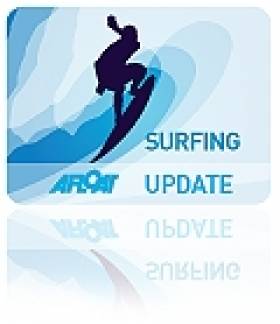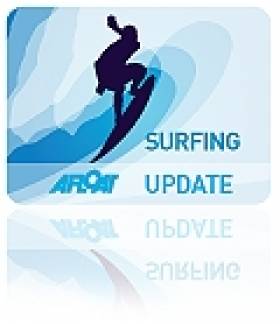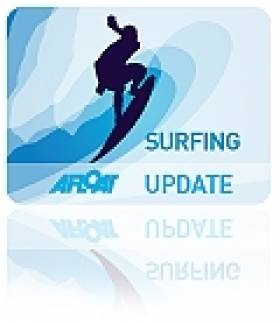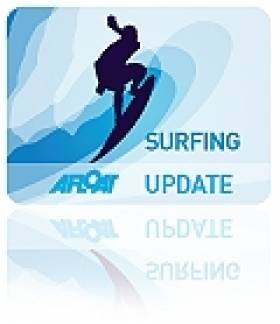Displaying items by tag: Sea Sessions
Upcoming Festivals Show What's Up With Irish Surfing
#Surfing - The biggest cash prize in Irish surfing will be up for grabs again this summer at the Sea Sessions Surf and Music Festival.
As JOE.ie reports, the Expressions Session is set to attract the biggest surfing names in Europe and beyond to Bundoran from 19-21 June for the €3,500 purse claimed last year by 17-year-old GearOid McDaid.
But you won't have to wait that long for the next surfing celebration in Ireland, as the popular Shore Shots film festival returns to the Light House Cinema in Smithfield on 11-12 April.
This year's events includes a live talk hosted by Banter that aims to ask the question: 'What's the story with Irish surfing?'
Big wave luminaries such as Peter Conroy of the Irish Tow Surf Rescue Club, MagicSeaweed editor Ed Temperley and Brian Britton of the legendary Donegal surfing clan will be on hand to discuss what makes Ireland such a strong destination for surfing.
Jim Carroll's On The Record blog has more on the story HERE.
#Surfing - Organisers of the 2014 Sea Sessions Surf and Music Festival have just announced details of their programme for 27-29 June.
Joining a number of top music acts will be some of the best competitors on the international circuit for Ireland’s 'biggest beach party of the year', which proved a big draw to the Donegal surfing hotspot last year.
The Sea Sessions Expression Session is returning in 2014 with the cream of European performance surfing taking on the best in Ireland.
The event format as usual is 'best move/air' and is organised in a way to allow the surfers to express themselves and push their performance.
“It is a really spectator-friendly format”, said organiser Pete Craig. “Most surf events are quote technical and not really that engaging for non-surfers. This unique format allows for and encourages explosive surfing that everyone can get.”
The competitors will hail from places such as France, Spain, Portugal, the Caribbean, the UK and Ireland.
William Alotti (Saint Martin) is returning to defend his title and is an early favourite. Toby Donachie (UK), who was one of the standout performers last year with some huge boosts, is also returning to challenge Alotti for a total prize pot of €3000.
Noah Lane (AUS) was the dark horse of the event last year, and after having settled in Bundoran, he may have some local knowledge that could aid him this year.
New for 2014 is the Malin Waters Fish Challenge, which will see a selection of local surfers and traveling pros attack the waves in some old-school shapes that have been selected for the event.
On the music side, top international talent will be joining the crème de la crème of Irish acts this year at Sea Sessions with Kelis, The Strypes and The Dandy Warhols all set to perform in Bundoran.
The full music line-up and festive activities can be found at www.SeaSessions.com.
#Surfing - Two national broadcasters will base themselves in Bundoran this week ahead of the Sea Sessions Surf Music Festival at the weekend.
Today FM’s KC Show will broadcast live from the Bundoran RNLI Lifeboat Station tomorrow 19 June and Thursday 20 June, while 2FM will broadcast from the Sea Sessions from Friday 21 to Sunday 23 June, giving the seaside town unprecedented national media coverage for five days.
As part of a recent Discover Ireland promotion on Today FM, listeners were asked where to send the various shows to on their holidays. Listeners to the KC Show had a choice of sending him to Dingle or Donegal and following thousands of votes, Donegal came out on top.
One of the locations suggested was Bundoran, and the RNLI Lifeboat station at the pier was chosen as the home for the KC Show for two daily broadcasts this week complete with live musical guests Walking With Cars and new Irish act Daithi.
No sooner will Today FM have packed up than the 2FM Roadcaster will be rolling into the Main Beach car park and preparing to broadcast from the Sea Sessions on Friday, Saturday and Sunday.
The national state broadcaster will give the festival unprecedented coverage with over 20 hours scheduled live from the beachfront. Jenny Greene, Cormac Battle, Ruth Scott and Paddy McKenna will all host their shows live across the weekend.
Bundoran tourism officer Shane Smyth commented: "I am thrilled that not one but two national broadcasters will be in town this week. It will be a welcome boost to the ongoing promotion of Bundoran as a destination.
"Speaking as Bundoran RNLI volunteer lifeboat press officer also, I’m obviously delighted that the RNLI will benefit from two days of national coverage and I know that KC and his team are keen to find out more about the lifeboat service here in Bundoran."
Smyth added: "The guys from 2FM had a great time when they were here a few weeks ago and we look forward to welcoming them again over Sea Sessions weekend. Last time they were here they brought scorching sunshine with them – let’s hope they do the same again!”
Sea Sessions is Ireland's "biggest and best" surfing and music festival and returns for its sixth successive year in 2013. Based in Bundoran, the festival also includes surf tour events in Lahinch, Co Clare and nearby Sligo.
Donegal Represents on Irish Team for Eurosurf 2011
Donegal will be represented by five surfers on the Irish team selected for the Eurosurf European Surfing Championships in Bundoran later this year.
Donegal Daily reports that Bundoran residents Ronan Oertzen (20), Shauna Ward (24), Darragh McCarter (25) and Richie Fitzgerald (36) will join 25-year-old Easkey Britton from Rossnowlagh on the team, after qualifying in a series of selection events.
One position on the team remains to be filled, and will be decided in a 'surf-off' between Rossnowlagh's John Britton and Keith O'Brien from Tramore at the Sea Sessions festival in Bundoran from 24-26 June.
The Irish Surf team will be coachedby Pascal Devine and managed by Stevie Burns, who have 40 years of surfing experience between them.
Donegal Daily has more on the story HERE.



























































